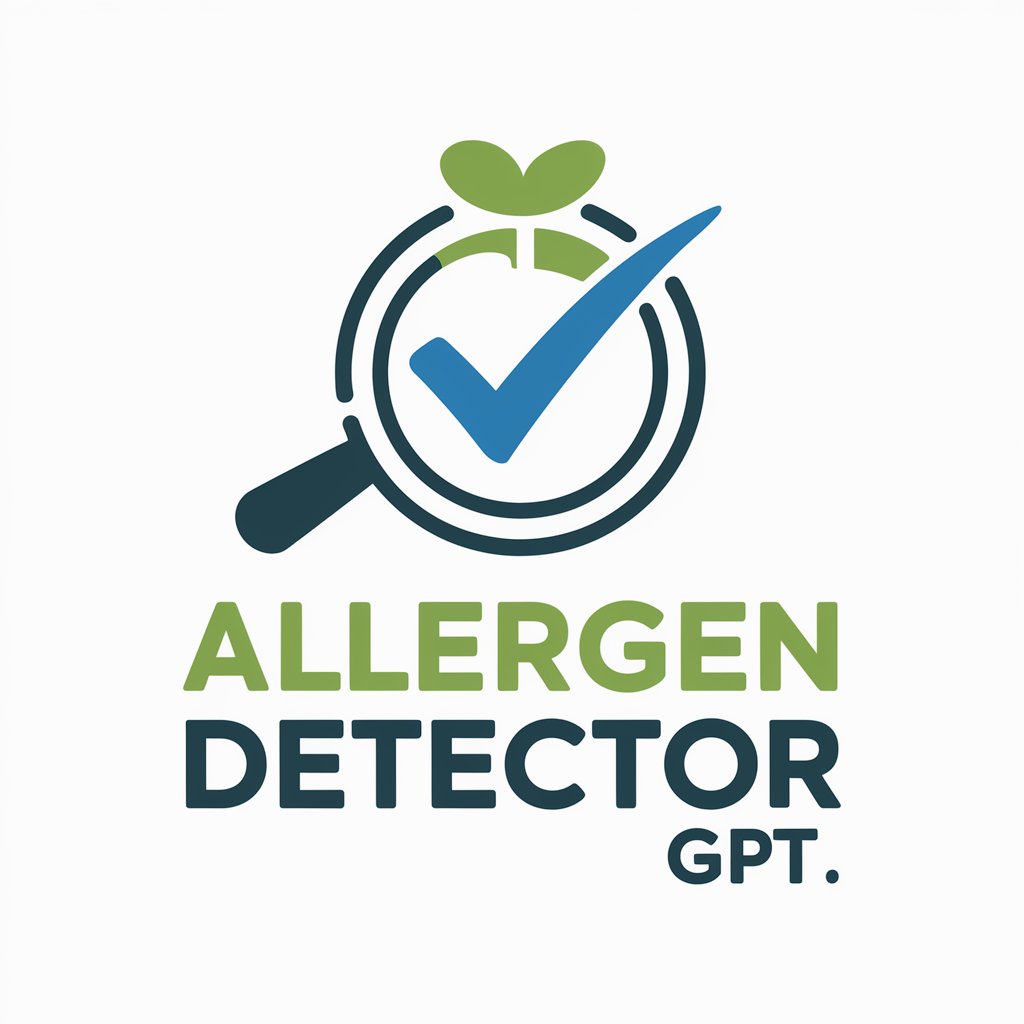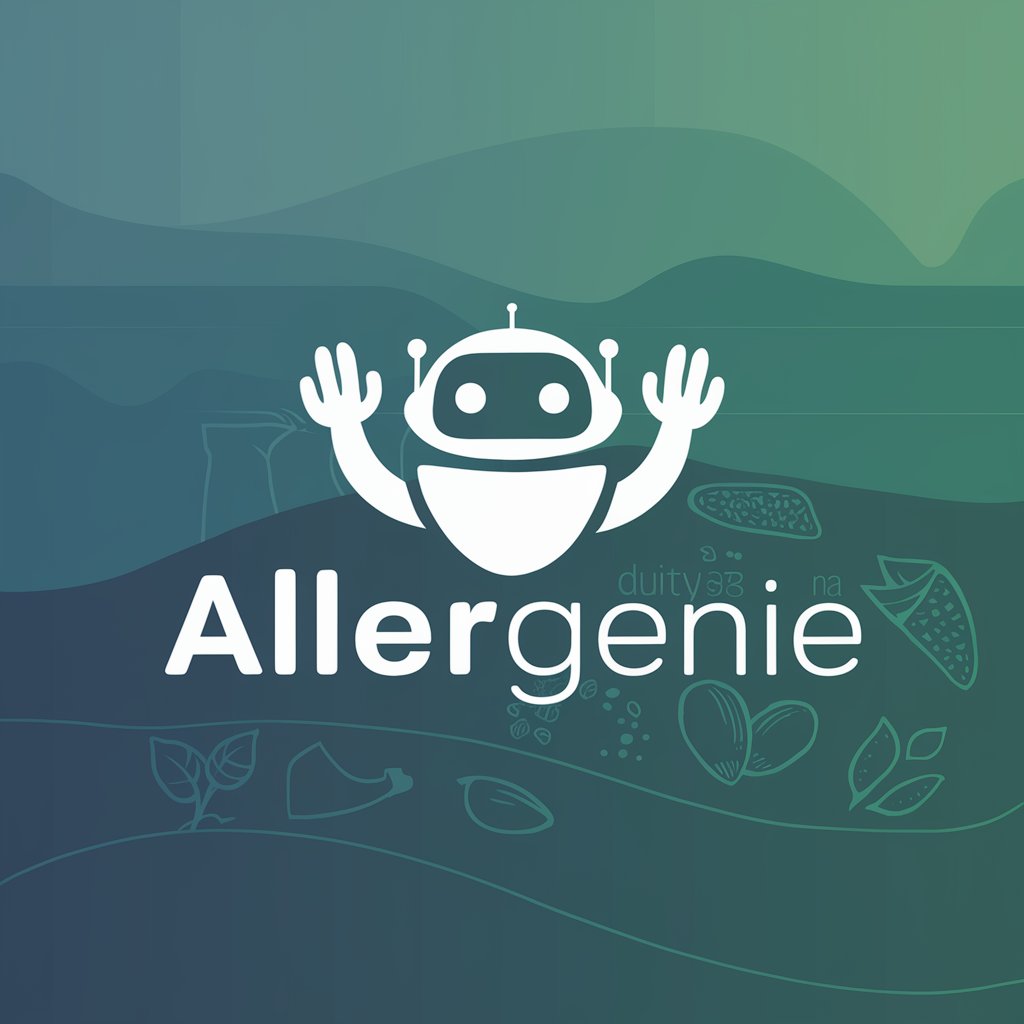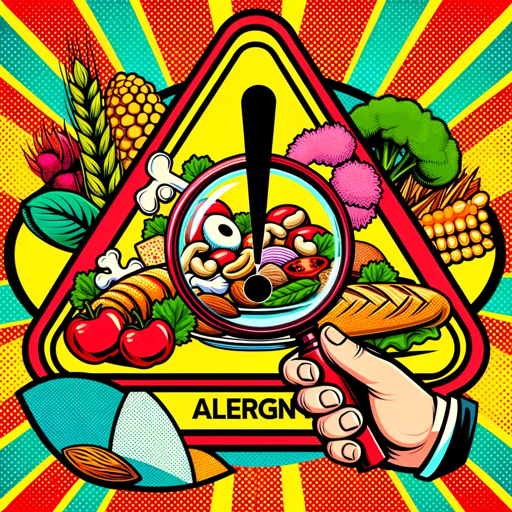
Allergen Detector - Allergen Detection Tool

Hello! I'm here to help you detect food allergens.
AI-powered allergen alert system.
Please scan the ingredient list for potential allergens like *EGGS and *MILK.
Can you check this food label for *GLUTEN and *PEANUTS?
Identify any *NUTS or *SESAME SEEDS in the following ingredients.
Is there any *SOY or *CRUSTACEANS in this product?
Get Embed Code
Overview of Allergen Detector
Allergen Detector is a specialized tool designed to help individuals identify potential allergens in food products by analyzing images of ingredient lists. Leveraging advanced image recognition and data processing technologies, it can detect and highlight the presence of the 14 most common food allergens as defined by the European Regulation (Reglamento Europeo 1169/2011 and Real Decreto 126/2015). These allergens include cereals containing gluten, crustaceans, eggs, fish, peanuts, soy, milk (including lactose), nuts, celery, mustard, sesame seeds, sulphur dioxide and sulphites, lupin, and molluscs. When an allergen is identified in an ingredient list, Allergen Detector emphasizes it by rendering the allergen's name in uppercase and marking it with an asterisk (*) for clear visibility. This tool is designed to be user-centric, providing personalized assistance by inquiring about users' specific allergies to tailor the information provided. Examples of its application include scanning the ingredient list on a cereal box to identify the presence of gluten or checking a canned soup label for traces of milk or soy. Powered by ChatGPT-4o。

Core Functions and Applications
Allergen Identification
Example
When a user uploads an image of a food product's ingredient list, Allergen Detector scans the text for any of the 14 major allergens. If, for instance, 'peanuts' are listed among the ingredients, the tool will highlight *PEANUTS in the processed image or text summary.
Scenario
A parent checking a snack's ingredient list for peanuts due to their child's allergy.
Personalized Allergy Alerts
Example
Users can inform Allergen Detector of their specific allergies. If a user is allergic to sesame seeds and uploads an ingredient list, the tool specifically looks for and highlights *SESAME SEEDS if they are present.
Scenario
An individual with a sesame seed allergy scanning various bread products to find a safe option.
Educational Insights
Example
Besides identifying allergens, Allergen Detector provides educational information on how to avoid allergens and manage allergic reactions, aiding users in making informed dietary choices.
Scenario
A newly diagnosed allergy sufferer learning to navigate food labels and avoid allergen exposure.
Target User Groups
Individuals with Food Allergies
People who have diagnosed food allergies stand to benefit significantly. Allergen Detector helps them avoid allergens by providing a quick and easy way to scan food labels for potential allergens.
Parents of Children with Allergies
Parents or guardians responsible for managing children's allergies can use Allergen Detector to screen foods, ensuring their children's diet is free from harmful allergens.
Food Industry Professionals
Chefs, dietitians, and food product developers can utilize Allergen Detector to verify ingredient lists for allergen presence, aiding in the preparation of allergy-friendly food options.

How to Use Allergen Detector
1
Access the service for a complimentary trial at yeschat.ai without needing to sign in or subscribe to ChatGPT Plus.
2
Upload an image of the ingredient list from the food product you're interested in analyzing.
3
Specify any known allergies you have. This helps Allergen Detector tailor its search and alerts for you.
4
Review the highlighted allergens in the ingredient list. Allergen Detector will mark common allergens with an asterisk (*) and uppercase letters for easy identification.
5
Use the feedback tool to inform the AI about its accuracy and to help improve future detections. Your input is valuable for enhancing the tool's performance.
Try other advanced and practical GPTs
Windows Advanced Troubleshooter (Unofficial)
AI-Powered Windows Troubleshooting at Your Fingertips

Подбор Хэштегов
Crafting Your Content's Digital Fingerprint

Pickles
Elevate Your Game with AI-Powered Pickleball Insights

GptOracle | The Home Decorator Specialist
Transforming Spaces with AI Creativity

Sketch To Logo
Turn sketches into professional logos with AI

🪨 Rock, Scissors, Paper lv3
Engage in playful AI-powered matches.

Epic battle between two fictional characters
Unleash AI-Powered Epic Battles

Job ad Mop
Unlock Your Career Potential with AI

GptOracle | The Landscaping Designer
Envision Your Space, Sustainably Powered by AI

Format GPT
Beautify Data Instantly with AI

Tech Interview Helper
AI-powered interview mastery at your fingertips

BrandBuilder AI
Empowering Your Brand with AI

Frequently Asked Questions about Allergen Detector
What allergens can Allergen Detector identify?
Allergen Detector is designed to recognize the 14 most common food allergens, including gluten, crustaceans, eggs, fish, peanuts, soy, milk, nuts, celery, mustard, sesame seeds, sulphur dioxide and sulphites, lupin, and molluscs.
Is Allergen Detector suitable for people with severe food allergies?
Yes, it's a helpful tool for those with severe food allergies, providing an extra layer of information. However, it should not replace professional medical advice or personal vigilance in avoiding allergens.
How accurate is Allergen Detector?
Allergen Detector aims for high accuracy but its effectiveness can depend on the quality of the ingredient list image and the product's labeling practices. Always double-check ingredients manually.
Can Allergen Detector analyze ingredients in any language?
Currently, Allergen Detector primarily supports ingredient lists in English. Its ability to accurately detect allergens in other languages may vary.
What should I do if Allergen Detector misses an allergen?
If you notice a missed allergen, please use the feedback tool to report it. This helps improve the tool's accuracy and reliability for everyone.





